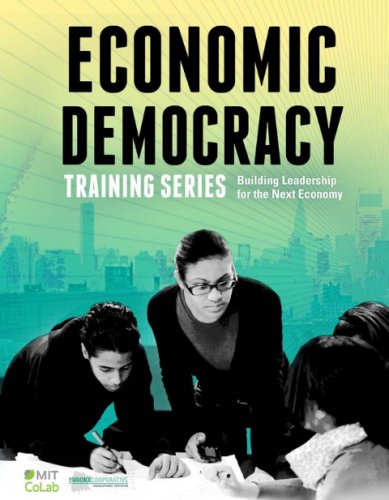The MIT Community Innovators Lab and the The Bronx Cooperative Development Initiative have jointly compiled an extensive training workshop series that focusses on allowing excluded populations to engage, unite, and participate in civil society in pursuit of developing sustainable business strategies that generate shared wealth. This unique 10-session, 20-hour curriculum was designed as a tool for leaders to “galvaniz[e] their communities to take a hands-on, democratic approach to local community economic development that would pave the way for all residents, not just those who currently control a majority of the resources, to thrive.”
Among the cutting-edge workshops developed in training resource is a session entitled “Building Strong Local Economies: Wealth and Ownership,” which guides participants through the myriad societal engines for wealth concentration, showing them concrete strategies to dismantle the drivers of wealth inequality using community and cooperative ownership. The workshop toolboxes provided in the document are comprehensive and include instructions for facilitators, visual aids in the form of PowerPoints slides, a detailed agenda, discussion questions, and post-workshop activities.
Download the Economic Democracy Training Series
Table of Contents
Introduction
Guide to Using this Curriculum
Introduction to Economic Democracy
I. Welcome and Introductions
II. Defining “the Economy”
III. Building Your Ideal Community
IV. Economic Cycles in US History
V. Break (optional)
VI. Economic Democracy
VII. Conclusion and Evaluation
Appendix A: Reference Materials
Appendix B: Visual Aids
Appendix C: Handout No 1 Instructions For Building Your Own Community
Appendix D: Handout No 2 The Cycle of Crisis
Appendix E: Handout No 3 Ruling Institution vs Economic Democracy Framework
Appendix F: Handout No 4 Mondragon Cooperative
Appendix G: Economic Democracy Framework
Appendix H: Handout No 6 Evaluation Form
Appendix I: Handout No 7 Major Takeaway Points
Markets and Economic Actors
I. Welcome and Introductions
II. A Simple Corn Economy
III. Owners, Laborers, and Financiers
IV. Producers and Consumer
V. Break (optional)
VI. Cases in Economic Democracy
VII. Conclusion and Evaluation
Appendix A: Reference Materials
Appendix B: Visual Aids
Appendix C: Handout No1 Cases in Economic Democracy
Appendix D: Handout No 2 Evaluation Form
Appendix E: Handout No 3 Major Takeaway Points
Building Strong Local Economies I: Introduction to Economic Development
I. Welcome and Introductions
II. Story of Development as Usual
III. Strong and Weak Economies
IV. Economic Base Theory
V. Break (optional)
VI. Economic Development Proposals for the Bronx
VII. Conclusion and Evaluation
Appendix A: Reference Materials
Appendix B: Visual Aids
Appendix C: Handout No 1 Examples of Endogenous Economic Development
Appendix D: Handout No 2 Profile of the Bronx
Appendix E: Handout No 3 Local Economic Development Strategies
Appendix F: Handout No 4 Evaluation Form
Appendix G: Handout No 5 Major Takeaway Points
Building Strong Local Economies II: Wealth and Ownership
I. Welcome and Introductions
II. What is Wealth?
III. Wealth Inequality in the US
IV. Break (optional)
V. Types of Wealth
VI. Case Studies and Wealth Matrix
VII. Conclusion and Evaluation
Appendix A: Reference Materials
Appendix B: Visual Aids
Appendix C: Handout No1 8 Forms of Capital/ Wealth Matrix
Appendix D: Handout No 2 Examples of Asset Building and Wealth Generation
Appendix E: Handout No 3 Evaluation Form
Appendix F: Handout No 4 Major Takeaway Points
Economies in Crisis: The Great Recession
I. Welcome and Introductions
II. What Led to the Great Recession?
IV. Break (optional)
V. Government Responses to Economic Crises
VI. The Machine
VII. Conclusion and Evaluation
Appendix A: Reference Materials
Appendix B: Visual Aids
Appendix C: Handout No1 The Cycle of Crisis
Appendix D: Handout No 2 Evaluation Form
Appendix E: Handout No 3 Major Takeaway Points
Economics and Oppression
I. Welcome and Introductions
II. Flawed Theory
III. The Wheel of Power
IV. Break (optional)
V. Concentric Circles: Structural Barriers to Dreams
VI. Fighting Oppression
VII. Conclusion and Evaluation
Appendix A: Reference Materials
Appendix B: Visual Aids
Appendix C: Handout No1 Fighting Oppression
Appendix D: Handout No 2 Evaluation Form
Appendix E: Handout No 3 Major Takeaway Points
Worker Cooperatives and Economic Democracy
I. Welcome and Introductions
II. Review Economic Democracy Principles
III. Play Co-opoly!
IV. Break (optional)
V. What is a Worker Cooperative?
VI. History and Challenges of Worker Cooperatives
VII. Conclusion and Evaluation
Appendix A: Reference Materials
Appendix B: Visual Aids
Appendix C: Handout No1 A Brief History of Worker Cooperative in the US
Appendix D: The Mondragon Experiment
Appendix E: Handout No 2 Evaluation Form
Appendix F: Handout No 3 Major Takeaway Points
Community Asset Mapping
I. Welcome and Introductions
II. Brainstorm of Needs
III. Portrait of Gifts
IV. Asset-Based Community Development
V. Break (optional)
VI. Inventory of Bronx Assets
VII. Leveraging Assets to Meet Needs
VIII. Conclusion and Evaluation
Appendix A: Reference Materials
Appendix B: Visual Aids
Appendix C: Handout No1 Examples of Leveraging Assets
Appendix D: Handout No 2 Inventory of Assets
Appendix E: Handout No 3 Evaluation Form
Appendix F: Handout No 3 Major Takeaway Points
Government and Local Economic Development Policy
I. Welcome and Introductions
II. The Role of Government
III. Introduction to Policymaking
IV. Local Government Policymaking Strategies
V. Strategies for Implementing Economic Democracy
VI. Limitations of Policymaking
VII. Conclusion and Evaluation
Appendix A: Reference Materials
Appendix B: Visual Aids
Appendix C: Handout No1 Evaluation Form
Appendix D: Handout No 2 Major Takeaway Points
Labor Unions
I. Welcome and Introductions
II. Wage Exploitation Activity and Discussion
III. The Rise and Decline of the Labor Movement in the US
V. Labor Unions and Economic Democracy
VI. Conclusion and Evaluation
Appendix A: Reference Materials
Appendix B: Visual Aids
Appendix C: Handout No 1 Domestic Workers United
Appendix D: Labor Jeopardy
Appendix E: Contract
Appendix F: Handout No2 Evaluation Form
Appendix G: Handout No 3 Major Takeaway Points





